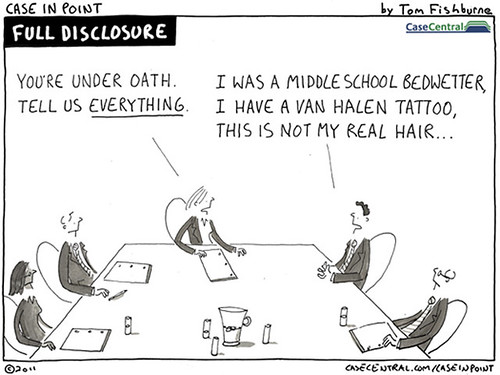
~ archived since 2018 ~

Actually, it may make things even worse.
Via Boston.com:
Disclosure doesnât solve problems the way we think it does, and in fact it can actually backfire. Coming clean about conflicts of interest, they find, can promote less ethical behavior by advisers. And though most of us assume weâd cast a skeptical eye on advice from a doctor, stockbroker, or politician with a personal stake in our decision, disclosure about conflicts may actually lead us to make worse choices.
âNone of us are saying that transparency is a bad thing,â says Daylian Cain, a behavioral economist at Yale University. âBut almost always, it fails to work as well as we think it does.â By assuming that disclosure is always a benefit, he and his colleagues argue, regulators may be failing to address the real problems caused by conflicts of interest. In fact, biases are rooted deep in our psychology, and canât be dispelled with a simple confession. Policies of disclosure, far from being a panacea, may be drawing attention away from the much harder work of removing conflicts and making sure that peopleâs advice and their interests align.
And:
People with a conflict gave biased advice to benefit themselves. But the twist came when the researchers required the experts to disclose this conflict to the people they were advising. Instead of the transparency encouraging more responsible behavior in the experts, it actually caused them to inflate their numbers even more. In other words, disclosing the conflict of interest â far from being a solution â actually made advisers act in a more self-serving way.
And:
Sunita Sah, a researcher at Duke Universityâs Fuqua School of Business, has conducted experiments focusing on doctor-patient interactions, in which a doctor prescribes a medication but discloses a financial interest in the company that makes the drug. As expected, most people said such a disclosure would decrease their trust in the advice. But in practice, oddly enough, people were actually more likely to comply with the advice when the doctorâs bias was disclosed. Sah says that people feel an increased pressure to take the advice to avoid insinuating that they distrust their doctor.
Sah sees people complying with biased advice as a way of helping their advisers, even in one-off interactions between strangers participating in a study. âPeople feel pressure to behave generously even if itâs not in their best interest,â she says. In these situations, she says, âinstead of being a warning, disclosure places this burden on the very people itâs supposed to protect.â
TheRedArchive is an archive of Red Pill content, including various subreddits and blogs. This post has been archived from the blog bakadesuyo.
| Title | Does “full disclosure” really address conflicts of interest? |
|---|---|
| Author | Eric Barker |
| Date | December 30, 2011 10:11 PM UTC (12 years ago) |
| Blog | bakadesuyo |
| Archive Link |
https://theredarchive.com/blog/bakadesuyo/does-full-disclosure-really-address-conflicts-of.14839 https://theredarchive.com/blog/14839 |
| Original Link | https://www.bakadesuyo.com/2011/12/does-full-disclosure-really-address-conflicts/ |

© TheRedArchive 2024. All rights reserved.
created by /u/dream-hunter